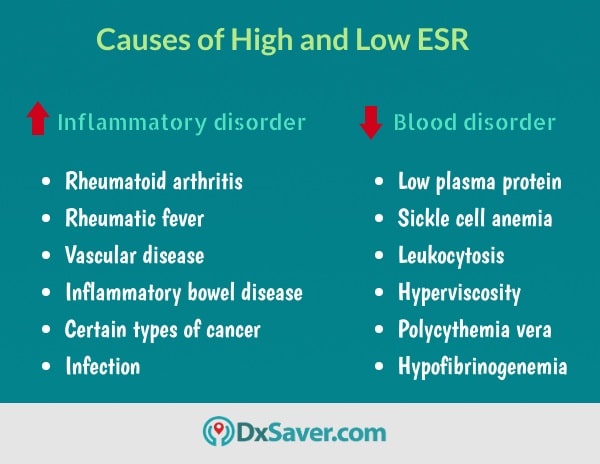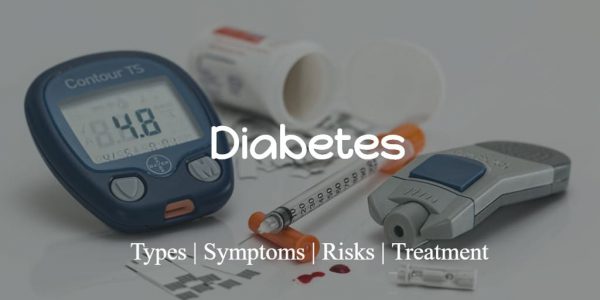
The medical abbreviation of ESR is “Erythrocyte Sedimentation Rate”. ESR test is a simple blood test that helps to monitor inflammation in the body. This test evaluates the rate at which red blood cells (RBCs) in the specimen test tube separate from blood serum over time, and settles/sediments at the bottom of the test tube. The ESR test helps is assessing unexplained fever, some types of arthritis, and symptoms that cause muscle aches. Erythrocyte Sedimentation Rate (ESR) test is also commonly known as a sedimentation rate or “sed rate test”.
The article below covers all the relevant topics of Erythrocyte Sedimentation Rate test like ESR test cost, what is an ESR test, normal ESR levels, symptoms of high and low ESR levels, test procedure, risks, and ESR test provider locations.
- ESR test cost.
- What is an ESR test?
- Why is an ESR test done?
- What are the normal ESR levels?
- How is the ESR test done?
- Is there any preparation required before the test?
- Are there any risks in the test?
- What does the test result mean?
- Provider Locations
For our readers who are more interested in knowing the ESR test cost beforehand, we would like to begin with that section.
How much does the ESR test cost?
Erythrocyte sedimentation rate, ESR test cost ranges between $46 and $49 in different labs and facilities across the U.S. No prior appointment is required. Compare the price, order your test online and visit the nearest lab during lab business hours. Complete the procedure and get the results in your email in 2 to 3 business days.
The following table shows the ESR test cost at 2 of our partner laboratories (CLIA – Certified) network located across the U.S.
Name of our Partner Labs | Book Online |
HealthLabs
| Offer Price$49 |
Personal Testing Lab
| Offer Price$46 |
ESR test cost with insurance
Most of the health insurance policies in the U.S. cover the cost of the ESR test. However, the coverage offered by private health insurance companies and national health insurance programs like Medicare and Medicaid varies widely. So we recommend you to check the coverage of your plan with the insurance company before getting tested.
Our ESR testing providers do not accept any health insurance plan. But, on request, they can provide you with an itemized receipt containing all the details like the name and code of the test, and CPT code which is necessary for insurance reimbursement purposes.
What is an ESR test?
ESR test is also known as a sedimentation rate test or sed rate test. It is a type of blood test that measures the rate at which the erythrocytes (red blood cells) settle at the bottom of the test tube containing a blood sample.
Generally, red blood cells settle relatively slowly but sometimes they settle at a faster rate due to the presence of acute-phase reactants. The level of acute-phase reactants such as C-reactive protein (CRP) and fibrinogen increases in the blood in response to inflammation. So elevated ESR might indicate inflammation in the body. Inflammation is a reaction caused by the immune system in response to an infection or injury.
Why is an ESR test done?
An ESR test is mostly done to determine if you have a condition that causes inflammation including autoimmune disorders, cancers, and other infections. It helps to monitor an existing condition. Also, your physician might order an ESR test if you have the following symptoms that indicate an inflammatory disorder.
- Headaches
- Fever
- Unusual weight loss
- Anemia
- Loss of appetite
- Neck, shoulder or pelvic pain
- Pain in the abdomen
- Diarrhea
- Blood in the stool
- Joint pain or stiffness
However, the ESR test is not used as a diagnostic test. Mostly it is ordered with other tests like CRP test to rule out and confirm a diagnosis.
What are the normal ESR levels?
The ESR levels are measured in millimeters per hour (mm/hr). The normal sedimentation rates are as follows.
- Women under age 50 – 0 to 20 mm/hr
- Men under age 50 – 0 to 15 mm/hr
- Women above age 50 – 0 to 30 mm/hr
- Men above age 50 – 0 to 20 mm/hr
- Children – 0 to 10 mm/hr
How is the ESR test done?
During this test, a lab technician or a phlebotomist will cleanse the area to be injected with an antiseptic and wrap an elastic band around the upper arm to make the vein visible and pool with blood. He/she then injects a needle to draw a sample of blood and collects the sample in a test tube. The collected blood sample is then sent to the laboratory for further testing.
It takes less than 5 to 10 minutes to perform this test.
Is there any preparation required before the test?
There is no special preparation required for an ESR blood test. But it is very important to inform your physician if you are pregnant or on any medications such as oral contraceptives, aspirin, cortisone, and vitamin A as they may interfere with the ESR levels and result in an inaccurate diagnosis.
Are there any risks in the ESR blood test?
There are no possible risks or complications in the ESR test. But sometimes after the blood sample is drawn, you might feel dizziness, slight pain, bruise, soreness, or redness in the injected area for a very little period.
What does the test result mean?
If your ESR test results show high sed rate levels, it might indicate the possibility of the following conditions.
- Infection
- Autoimmune disorders
- Rheumatoid arthritis
- Rheumatic fever
- Vascular disease
- Inflammatory bowel disease
- Heart disease
- Kidney disease
- Thyroid disease
- Obesity
- Certain types of cancer
- Tuberculosis (TB)
If your sed rate test results show ESR levels slower than normal, it might indicate any of the following conditions.
- Congestive heart failure
- Low plasma protein
- Hypofibrinogenemia (too little fibrinogen in the blood)
- Polycythemia vera (a bone marrow disorder that leads to the excess production of RBCs)
- Sickle cell anemia (a genetic disease affecting the red blood cells)
- Leukocytosis (an unusual increase in white blood cells)
- Hyperviscosity (an increase in blood thickness)

Provider Locations
The ESR blood test can be done in any of the following locations across the U.S. by visiting the nearest lab. To know the ESR test cost, refer to the first section of the article.
- Alabama
- Arizona
- Arkansas
- California
- Colorado
- Connecticut
- Delaware
- Florida
- Hawaii
- Georgia
- Idaho
- Illinois
- Indiana
- Iowa
- Kansas
- Kentucky
- Louisiana
- Maine
- Michigan
- Minnesota
- Mississippi
- Missouri
- Montana
- Nebraska
- Nevada
- New Hampshire
- New Mexico
- North Carolina
- North Dakota
- Oklahoma
- Oregon
- Pennsylvania
- Puerto Rico
- South Carolina
- South Dakota
- Tennessee
- Texas
- Utah
- Vermont
- Virginia
- Washington
- West Virginia
- Wisconsin
- Wyoming
Frequently Asked Questions
Will insurance cover my testing cost?
No, insurance will not be covered in the billing. However, they will provide you a receipt for insurance reimbursement purposes.
How should I book my appointment?
You can choose the most suitable provider from above and make an appointment by following the instructions mentioned by them.
Can I cancel my lab test order?
Yes, you can cancel your lab test order anytime before your testing. A refund will be initiated after deducting the cancellation fee. However, cancellation is at the discretion of the provider.
Do the providers offer result interpretations?
Yes, a few providers may provide doctor consultation who will take you through the results and provide clarification if needed.
How do I receive my report?
To ensure your privacy, the test report will be mailed to you by the provider.
Other topics you may be interested in:-
- Signs and Symptoms of Oral Syphilis
- STD Testing Cost in the U.S.
- What STDs cause Sore Throat?
- Growth Hormone (GH) Test Cost in the U.S.
- Can I Get an STD from a toilet seat?
- Testosterone Test Cost in the U.S.
- RBC blood test cost in the U.S.
- Cost of Estrogen Test in the U.S.
- How much does CEA Testing Cost in the U.S?
- Stool Culture Test Cost in the U.S.
- Cost of D-dimer Test Cost in the U.S.
- Ovulation Test Cost in the U.S.
- How much does the Prolactin Test Cost in the U.S?
- Why is Gonorrhea STD called “The Clap”?
- Causes of Penile Rashes and Other STD Symptoms in Men
- Types of STDs that cannot be cured
- HPV in Women: Symptoms, Genital Warts, Treatment and More
- Oral STDs: Names, Symptoms, Treatment and Testing Cost






